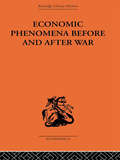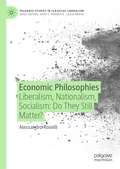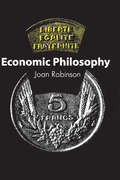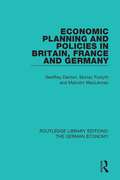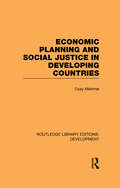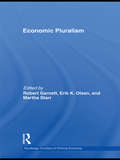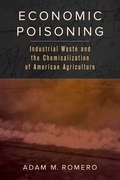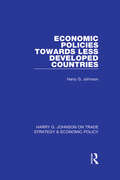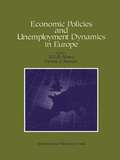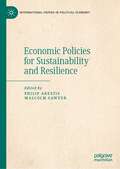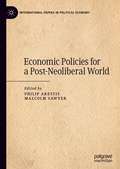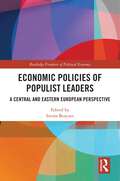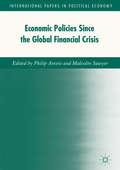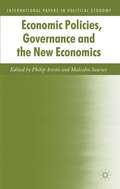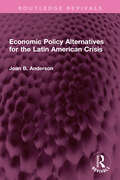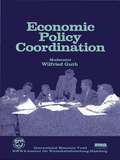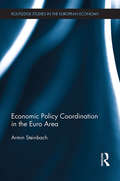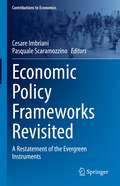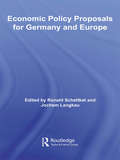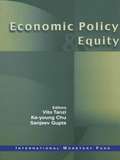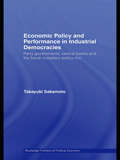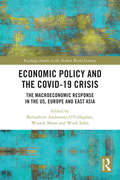- Table View
- List View
Economic Phenomena Before and After War: A Statistical Theory of Modern Wars
by Slavko SecerovEconomic Phenomena before and after War is the result of the author's search for a scientific explanation of modern wars, by means of economic statistical data, in the statistics of consumption, production and natural growth of population. The theory discussed assumes that a state of war in modern communities is dependent on the general economic equilibrium, which becomes more and more unstable as industrialization progresses. A state of war indicates a turning point in the action of balancing forces; it moves the economic forces in an opposite direction and is therefore a means for stabilizing the general economic equilibrium.
Economic Philosophies: Liberalism, Nationalism, Socialism: Do They Still Matter? (Palgrave Studies in Classical Liberalism)
by Alessandro RoselliThe book shows the ideological underpinning of the economist’s work, and the ideological perspectives are those that have largely prevailed in the last couple of centuries: liberalism, nationalism and socialism. It is on the ground and strength of these ideologies that systems of political economy have been built. Roselli explores the connections between theory and value judgements to identify the philosophical premises behind the economic reasoning of economists as diverse as Smith, Ricardo, Marx, Pareto, Keynes, Hayek, among others. Liberalism originally leaned towards an unhindered laissez-faire, then towards a wider role of the State in the economic system, under the influence of socialist ideology, then again it has relied on an individualistic approach to issues of wealth production and distribution; more recently the unrealiability of this approach has been revealed by systemic crises, suggesting new reflections and uncertainties about the coherence of economic reasoning with the liberal idea: an institutional and historical perspective may open new spaces to the understanding of a liberal and capitalistic economy. The vicissitudes of economic nationalism, its statist and protectionist features, its decline and recent resurgence are examined, being unclear what shape it is currently taking from an economic and political viewpoint. This is particularly obscure in the case of that specific form of nationalism called populism. The decline and fall of Marx’s historical materialism cannot hide the inherent contrast of interest between the two sides of a labour contract. The lasting legacy of socialism is the enduring and multiform relevance – from a cowed labour force to environmental issues - of social themes in modern economies.
Economic Philosophy (Pelican Ser.)
by Joan Robinson"Economics has always been partly a vehicle" for the ruling ideology of each period as well as partly a method of scientific investigation. It limps along with one foot in untested hypotheses and the other in untestable slogans. Here our task is to sort out as best we may this mixture of ideology and science."With these provocative words, Joan Robinson introduces this lively and iconoclastic book. "In what follows," she says, "this theme is illustrated by reference to one or two of the leading ideas of the economists from Adam Smith onwards, not in a learned manner, tracing the development of thought, nor historically, to show how ideas arose out of the problems of each age, but rather an attempt to puzzle out the mysterious way that metaphysical propositions, without any logical content, can yet be a powerful influence on thought and action."Robinson is responsible for some of the most austerely professional contributions to economic theory, but here in effect she takes the reader behind the scenes and cheerfully exposes the dogmatic content of economic orthodoxy. In its place, she offers the possibility that with obsolete metaphysics cleared out of the way economics can make a substantial advance toward science. .
Economic Philosophy (Routledge Classics)
by Joan RobinsonJoan Robinson (1903-1983) was one of the greatest economists of the twentieth century and a fearless critic of free-market capitalism. A major figure in the controversial ‘Cambridge School’ of economics in the post-war period, she made fundamental contributions to the economics of international trade and development. In Economic Philosophy Robinson looks behind the curtain of economics to reveal a constant battle between economics as a science and economics as ideology, which she argued was integral to economics. In her customary vivid and pellucid style, she criticizes early economists Adam Smith and David Ricardo, and neo-classical economists Alfred Marshall, Stanley Jevons and Leon Walras, over the question of value. She shows that what they respectively considered to be the generators of value - labour-time, marginal utility or preferences - are not scientific but ‘metaphysical’, and that it is frequently in ideology, not science, that we find the reason for the rejection of economic theories. She also weighs up the implications of the Keynesian revolution in economics, particularly whether Keynes’s theories are applicable to developing economies. Robinson concludes with a prophetic lesson that resonates in today’s turbulent and unequal economy: that the task of the economist is to combat the idea that the only values that count are those that can be measured in terms of money. This Routledge Classics edition includes a new foreword by Sheila Dow.
Economic Planning and Policies in Britain, France and Germany (Routledge Library Editions: The German Economy #3)
by Geoffrey Denton Murray Forsyth Malcolm MacLennanExamining the innovations of economic policy in the UK, France and Germany in the 1960s, this book originally published in 1968, assesses the degree of success of these policies and draws conclusion for the oreintation of future policy. The book contrasts the long history of national planning in France with the equally long history of anti-p[lanning ideology in Germany and by close examination of the actual policies, brings out the relaities that lie behind the public attitudes. It discusses the problems which lead to planning interventions, followed by a chapter on the UK, France and Germany. It examines in details particular adaptations of policy: namely quantitative programming, monetary policy, fiscal policy, public expenditures, regional policy, prices and incomes policy and the balance of payments, comparing developments in all 3 countries. It also looks at the beginning of economic planning at the level of the EEC, with particular implications for British entry.
Economic Planning and Social Justice in Developing Countries
by Ozay MehmetFirst published in 1978, this book was written at a time when belief was high in Western-guided economic development of the emerging countries. The success of Marshall Plan in war-torn Europe generated a US-led optimism that, with generous inflows of aid and technical assistance, the Third World could be won over in the Cold War. The author’s direct experience as a young academic economist in Cyprus, Malaysia, Uganda and Liberia led him to question this general optimism: the reality on the ground in the developing world did not seem to match Western optimism. Theories and blueprints, made in the West, did not fit the requirements of developing countries. Higher production and better income distribution were inseparable twin objectives of developing nations. That meant, production of a higher national output must at the same time promote social justice. Investment must create adequate jobs so that new entrants into rapidly expanding labor force could be gainfully employed. Yet, the dominant (Western) theories of development at the time, in particular the Trickle Down Theory of Growth, prescribed "Growth First, Distribution Later" strategy. Similarly, Import Substitution Industrialization theories were emphasized at the expense of export-led growth. Dualistic Growth theories preached urban-biased, anti-rural development. This book was written as a rebuttal of such faulty theorizing and misguided professional technical assistance and the book’s message is no less valid today than in the 1970’s.
Economic Pluralism (Routledge Frontiers of Political Economy #122)
by Robert Garnett Erik K. Olsen Martha StarrEconomists in the post-Cold War era are increasingly circumspect about universal, one-size-fits-all conceptions of human behaviour and economic institutions. Contemporary economics is thus marked by a nascent pluralism. Economic Pluralism brings these pluralist sensibilities to the fore. Its twenty original essays explore the positive potential and critical limits of pluralism in economic theory, philosophy, institutions, and policies, and education. These twenty original essays reflect the maturity and breadth of pluralist scholarship in economics today. The first eight chapters (including critical essays by Tony Lawson, Diana Strassmann et al., Frederic Lee, and David Colander) stake out contentious positions on the value of pluralism in economic theory and philosophy. The remaining chapters explore the meaning and consequences of pluralism in economic education, institutions, and policies. This volume provides a unique "second generation" discussion of pluralism in economics. Its twenty original essays stake out contentious positions on pluralism in economic theory, philosophy, institutions, and policies, and education, reflecting multiple generations and traditions of thought. It is a volume certain to spur wider conversation about the scope and value of economic pluralism for the 21st century. This volume would be of most interest as a supplementary text for graduate or undergraduate courses that include units on heterodox economics or economic philosophy.
Economic Poisoning: Industrial Waste and the Chemicalization of American Agriculture (Critical Environments: Nature, Science, and Politics #8)
by Adam M. RomeroThe toxicity of pesticides to the environment and humans is often framed as an unfortunate effect of their benefits to agricultural production. In Economic Poisoning, Adam M. Romero upends this narrative and provides a fascinating new history of pesticides in American industrial agriculture prior to World War II. Through impeccable archival research, Romero reveals the ways in which late nineteenth- and early twentieth-century American agriculture, especially in California, functioned less as a market for novel pest-killing chemical products and more as a sink for the accumulating toxic wastes of mining, oil production, and chemical manufacturing. Connecting farming ecosystems to technology and the economy, Romero provides an intriguing reconceptualization of pesticides that forces readers to rethink assumptions about food, industry, and the relationship between human and nonhuman environments.
Economic Policies Towards Less Developed Countries (Harry G. Johnson on Trade Strategy & Economic Policy #1)
by Harry G. JohnsonOriginally published in 1967, this book examines the major problems of trade and aid policy posed for the developed countries by the UN Conference on Trade and Development in 1964. Johnson surveys the political and economic setting of the Conference; international aspects of economic development; trade policy to promote development; possible new international arrangements for trade in primary products; and the possibilities offered by international monetary reform for benefitting less developed countries. The divergence between the well-being of developed and less-developed countries remains one the key problems of our time and this book is therefore as relevant now as when it was first published.
Economic Policies and Unemployment Dynamics in Europe
by S.G.B. HenryA report from the International Monetary Fund.
Economic Policies for Sustainability and Resilience (International Papers in Political Economy)
by Philip Arestis Malcolm SawyerThis book explores the issues caused by climate change and environmental degradation, alongside the economic policies that can help secure an environmentally sustainable future. Through examining sustainability and resilience, the neoliberal globalised trading system and recent economic policies are questioned to inquire into whether capitalist economies are compatible with addressing climate change. Prolonged economic growth, forms of ownership, economic equality, the global ecosystem, universal basic services, the Green New Deal, and inclusive growth, are also discussed. Economic Policies for Sustainability and Resilience aims to provide policy options to develop sustainable and resilient market economies. It will be relevant to students, researchers, and policymakers interested in the political economy, environment economics, and economic policy.
Economic Policies for a New South Africa
by Desmond Lachman Robert Corker Kenneth Bercuson Daudi Ballali Charalambos Christofides James WeinAgainst a backdrop of the dismantling of apartheid and the current government's commitment to negotiating a new constitution based on universal suffrage and protected human rights, discussions are under way on the appropriate economic policies to be pursued in the new political climate. This paper focuses on the redistributive and growth policies needed in the new South Africa.
Economic Policies for a Post-Neoliberal World (International Papers in Political Economy)
by Philip Arestis Malcolm SawyerThe period of past four decades has been characterized as one of neo-liberalism, financialization, globalization, privatization and de-regulation. Inequality has risen in industrialised countries, labour’s share in national income has been in decline and economic growth slowed. The evidence of the damage to the environment from human economic activity, and the dramatic consequences of failure to address climate change have become more apparent and urgent. The global financial crises shocked the complacency of the neo-liberal era, though a decade later it may be doubted how much has changed. The central purpose of this volume is to investigate a range of economic and social policies, which move in the direction of constructing a post-neoliberal world. These range over alternative forms of ownership (public, co-operative), policies to address and reverse economic and social inequalities, responses to the forces of globalization, re-constituting the financial system and its roles, and the nature of employment.
Economic Policies of Populist Leaders: A Central and Eastern European Perspective (Routledge Frontiers of Political Economy)
by István BenczesProviding a comparative analysis of Central and Eastern European economies, this book explores the economic impacts of populism in those countries in the region which have seen some form of populist rule. Populism has been thriving in the new member states of the EU ever since the outburst of the global financial and economic crisis, but unlike the cases of Latin America, Brexit or the Trump administration, the emphasis has not been on trade protectionism or unsustainable macroeconomic policies in these countries. This book demonstrates that studying macroeconomic variables such as fiscal balance or current account positions cannot tell the whole story of the economic consequences of populism. Instead, a more nuanced scrutiny of who gets what under populist rule is required. Adopting the ideational definition of populism, the volume shows that Central and Eastern European populists have heavily reshaped redistributive policies; yet, they have not neglected the budget constraint of the general government. Instead, there has been a tendency to disregard the institutional constraints of decision-making in the economy and, in turn, to redefine the regulatory framework and property rights structure of the respective economies. This innovative edited volume will be of interest to readers in political economy and political science who wish to better understand the impacts of populism.
Economic Policies since the Global Financial Crisis
by Philip Arestis Malcolm SawyerThis book investigates the changing nature of economic policies following the Global Financial Crisis of 2007-9. Well-respected, international scholars come together to discuss the level of economic growth following the crisis, concerns over inequality in industrialised countries, and labour market policies.
Economic Policies, Governance and the New Economics
by Philip Arestis Malcolm SawyerThis volume concentrates on international issues that relate to economic policies and governance. It is essential reading for all postgraduates and scholars looking for expert discussion and debate of the issues surrounding the case for new economic policies at the global level.
Economic Policy Alternatives for the Latin American Crisis (Routledge Revivals)
by Joan B. AndersonFirst Published in 1990 Economic Policy Alternatives for the Latin American Crisis aims to explore macroeconomic policy alternatives available to Latin American policymakers from both a theoretical and an empirical perspective. Three decades of sustained growth and dramatic gains in levels of economic development in Latin America ended in the 1980s. Latin American countries found themselves plagued by foreign debts, high real interest rates, accelerated inflation, increasing poverty with malnutrition and high unemployment. This book presents a quantitative framework in which to evaluate the effectiveness of various types of monetary and fiscal policies under the conditions of inflation, declining growth, and debt. A macroeconomic policy model is constructed and using data from Ecuador the model is estimated empirically. The results of these simulations suggest some promising policy options to replace the current policy. This book is an interesting read for scholars and researchers of Latin American economics, macroeconomics and development economics.
Economic Policy Coordination in the Euro Area (Routledge Studies in the European Economy)
by Armin SteinbachThe European debt crisis has given new impetus to the debate on economic policy coordination. In economic literature, the need for coordination has long been denied based on the view that fiscal, wage and monetary policy actors should work independently. However, the high and persistent degree of macroeconomic disparity within the EU and the absence of an optimum currency area has led to new calls for examining policy coordination. This book adopts an institutional perspective, exploring the incentives for policymakers that result from coordination mechanisms in the fields of fiscal, monetary and wage policy. Based on the concept of externalities, the work examines cross-border spillovers (e.g. induced by fiscal policy) and cross-policy spillovers (e.g. between fiscal and monetary policies), illuminating how they have empirically changed over time and how they have been addressed by policymakers. Steinbach introduces a useful classification scheme that distinguishes between vertical and horizontal coordination as well as between cross-border and cross-policy coordination. The author discusses farther-reaching forms of fiscal coordination (e.g. debt limits, insolvency proceedings, Eurobonds) with special attention to how principals of state organization affect their viability. Federal states and Bundesstaaten differ in the incentives they offer for debt accumulation – and thus in their suitability for fiscal coordination. Steinbach finds that the originally strict separation between policy areas has undergone significant change during the debt crisis. Indeed, recent efforts to coordinate policy are no longer limited to one policy area, but now extend to several areas. Steinbach argues that further fiscal policy coordination can be effectively deployed to address policy externalities, but that the coordination mechanisms used must match the form of state organization in the first place. Regarding wage policies, there are significant barriers to coordination. Notwithstanding some empirical successes in the implementation of a productivity-oriented wage policy, the high heterogeneity of national wage-setting institutions is likely to prevent any wage coordination.
Economic Policy Frameworks Revisited: A Restatement of the Evergreen Instruments (Contributions to Economics)
by Cesare Imbriani Pasquale ScaramozzinoThis volume presents state-of-the-art contributions to the theory and practice of economic policy. In light of the 2007/2008 financial crisis and the COVID-19 pandemic, it discusses the relevance and effectiveness of various traditional economic policy tools and instruments. Written by experts in economics and public finance, the contributions highlight the virtues and institutional advantage of political authorities who can rely on a broader set of tools than those available to the private sector and are able to engage over a longer time horizon. The economic policy tools and prescriptions in this volume are founded on a rigorous reinterpretation of theoretical models of macroeconomics. The book is divided into two parts: The first part addresses issues in the theory of monetary and fiscal policy in intertemporal settings with forward-looking agents, in the context of both developed and developing countries. The second part presents applications to current economic policy issues, including a resilient bio-economy, public debt management, human capital and growth, migrants and labor supply, and start-up financing.
Economic Policy Making in Mexico: Factors Underlying the 1982 Crisis
by Robert LooneyThis volume argues that the Mexican crisis of August 1982, in which the country was left facing the prospect of national default and zero economic growth, was not only the result of some fundamental flaws in the country's economy, but is more accurately characterized as a cash flow problem--in the author's words, "a case of illiquidity rather than insolvency." Based on a thorough analysis of the Mexican economy, the book assesses the effectiveness of the various economic programs of the de la Madrid presidency in dealing with the nation's problems.
Economic Policy Proposals for Germany and Europe (Routledge Studies In The European Economy Ser.)
by Ronald Schettkat Jochem LangkauDespite exporting more good and services than any other country in the world, economic growth in Germany has been slow through the nineties and the early twenty first century with low wage growth, rising unemployment and increasing public deficits. German unemployment was traditionally diagnosed as structural, neglecting macroeconomic causes of eco
Economic Policy and Equity
by Vito TanziDuring the past decade, income gaps have widened in many parts of the world, industrial as well as developing. These have heightened concern about equity issues in economic policymaking. Equity and growth can be complementary: investment in human capital, for example, can boost growth in the long run. But choices are not always so easy. If growth and equity do not go hand in hand, when and how should governments ensure that the size of the pie increases and that everybody gets a fair share? This volume brings together the views not only of senior policymakers and academics but also of religious leaders and labor leaders from around the world who participated in an unprecedented IMF conference on the topic in June 1998. Contents include: Stanley Fischer, A View from the IMF IMF Fiscal Affairs Department, Should Equity Be a Goal of Economic Policy? Amartya Sen, Economic Policy and Equity: An Overview Anthony Atkinson, Equity Issues in a Globalizing World: The Experience of OECD Countries Lawrence Summers, Equity in a Global Economy Equity-Oriented Policymaking: Country Experience Eduardo Aninat and others, Addressing Equity Issues in Policymaking: Grzegorz Kolodko, Equity Issues in Policymaking in Transition Economies Anibal Cavaco Silva, Political Economy and the Equity-Policy Agenda Alberto Alesina, Too Large and Too Small Governments Enrique Iglesias, Equity Issues in Latin America Vito Tanzi is director of the Fiscal Affairs Department of the IMF. Ke-young Chu is a senior advisor and Sanjeev Gupta is a division chief in the department. An International Monetary Fund Book
Economic Policy and Performance in Industrial Democracies: Party Governments, Central Banks and the Fiscal-Monetary Policy Mix (Routledge Frontiers Of Political Economy Ser. #Vol. 101)
by Takayuki SakamotoThis book is the first systematic study of how the interdependence of fiscal and monetary policies and the interaction of party governments and central banks affect the fiscal-policy mix in eighteen industrial democracies in North America, Western Europe, Japan and Oceania. Sakamoto argues that central banks influence on economic policy is far mor
Economic Policy and the Covid-19 Crisis: The Macroeconomic Response in the US, Europe and East Asia (Routledge Studies in the Modern World Economy)
by Bernadette Andreosso-O’Callaghan, Woosik Moon and Wook SohnThis book offers an assessment of the different monetary and fiscal policy responses that have been implemented by national governments in major European and Asian countries faced with the Covid-19 crisis since 2020; it also deals with the case of the US experience as a benchmarking example. The book provides a comprehensive cross-country comparative study on health crisis management at the macroeconomic level. Its focus on monetary and fiscal policies across different countries in Asia, Europe and the USA makes it unique. Divided into three parts following a general introduction that sets the context of the study, the book deals with the case of the USA, EU and European countries as well as with that of key Asian countries. Of specific relevance is the European Union and euro-area contexts that serve as a framework to the different EU national monetary and fiscal policy responses. Each chapter deals with a specific country, including Italy and the UK in Europe and Singapore and South Korea in Asia, and covers the following topics: the extent of the outbreak of the public health crisis and its macroeconomic impact; the comparative examination of fiscal and monetary policy responses to both crises; and an overall assessment of the effectiveness of these policies along with the public health policy to mitigate the economic impact. Given the unprecedented nature of the Covid-19 crisis, anyone eager to know more about its macroeconomic impact and ensuing policies in a comparative framework will be keen to read this book. It will be essential reading to any researcher, policy maker and/or analyst working in the area of public policy and is also a unique contribution to the field of European studies, Asian studies and Comparative Economic Studies.
